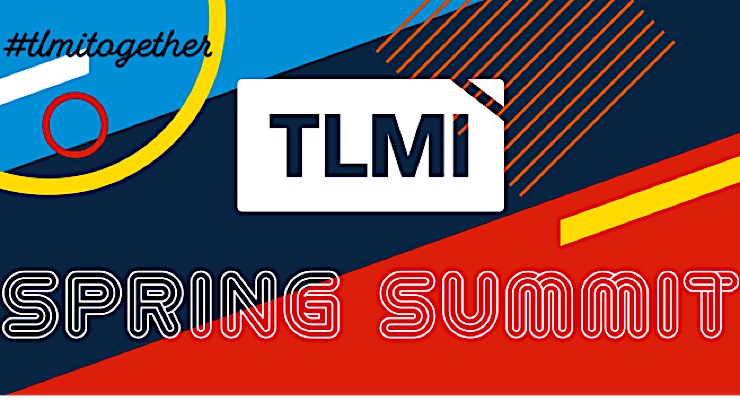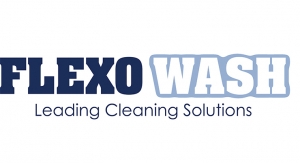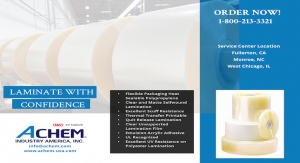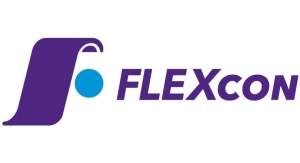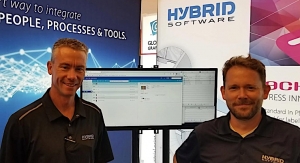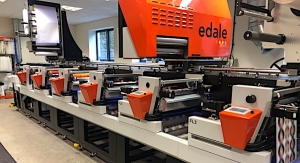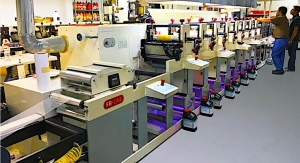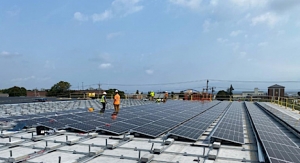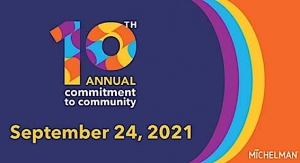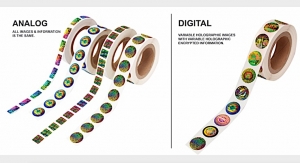Greg Hrinya, Editor04.16.21
Even though industry members were unable to meet in-person, TLMI delivered an action-packed Virtual Spring Summit, highlighting the latest industry trends and providing a forecast for the future.
Alan Beaulieu, president of ITR Economics and a fixture at TLMI events, shared his optimism for the immediate future while raising questions about the country’s long-term economic future. Beaulieu expects every piece of legislation that President Joe Biden touches to address climate change in some form, and he believes America’s relationship with China will continue to change going forward. Plus, a tax increase is on the horizon.
According to Beaulieu, we can expect to see an increase maximum corporate income tax rate to 28%, with a 15% minimum tax on corporate global book income. A 21% country-by-country foreign minimum tax is also envisioned.
While the immediate impact of the pandemic and vaccine rollout, presidential election, and various other fiscal policies remain to be seen, Beaulieu painted a strong picture for the next few years – into 2022-23. Even though taxes are expected to increase, that move will takes some time.
“First of all, I want to allay your fears,” said Beaulieu. “The Federal Reserve says interest rates will stay low, so that will be your friend this year. You won’t see a lot of increase in 2022-23. Now is the perfect time for you to make acquisitions. Make sure it’s paid off by 2030, and keep cash dry for years to come to fuel growth. Of course, you also want to make sure your products are state-of-the-art and innovative and that your supply chain is sound.”
Beaulieu also predicts more nationalism heading into the future, with President Biden’s plan to “Build Back Better.” Those that makes their products in the United States will receive a tax credit, and “one of the safest places to be sourcing from is the United States. The President is pushing hard for ‘Made in America.’ He wants to invest in America, and he wants the supply chain to return to America. This President is making a strong stand toward China.
“Make sure you’re investing in sales and marketing, your process; make sure you’re investing in you, from the front office to the back room,” he added. “That will increase your profitability heading into the future. Your business is going to continue to be the beneficiary of positive things. Well into 2022 you’re going to see yourself busy. Everything that you’re labeling and tagging will be doing better and better into 2022.”
Beaulieu advised on how to approach the manufacturing industry’s workforce challenge, as well. Research shows that on a new employee’s first day, 79% are already thinking of their next job. Therefore, a strong culture and a positive first impression are key in retention.
“You’re going to have to work harder at retention, doing everything you can to attract people,” noted Beaulieu. “Go to an HR expert, asking about attracting and retaining. Show your business to the community, focusing on everything, including how the outside of the facility looks.”
Other future trends include a shift toward e-commerce and more rise in the S&P 500. The trend toward e-commerce is not a death knell for the brick-and-mortar store, however.
“It’s an e-commerce world, but that’s not the end all, be all. You’re going to see demand on both sides,” he commented. There’s going to be a recovery in retail sales, and nothing but good news as population continues to expand.”
While the immediate future looks rosy, the year 2030 could pose a host of problems. Prices are well above profits, and that’s dangerous, Beaulieu cautions. “We’re in a situation where you can expect trouble down the road, but that’s not now. The younger generation should get the most out of the next nine years to grow as much wealth as you can. Meanwhile, the older generations need to protect against downturns and crashes in the future. How do I prepare for 2030? Some part of your portfolio should include equities so you’re prepared for what’s coming.”
Leadership panels
The TLMI Virtual Spring Summit featured an all-star cast of industry experts, ranging from converters to suppliers. The Converter Leadership Panel featured Brian Gale, CEO of ID Images, Michelle Zeller, president of AWT, Thomas Barrett, president of Macarthur Corporation, John Fischer, owner of StickerGiant, and Mark Pollard, CEO of Brook & Whittle.
The panel provided the experts an opportunity to share their thoughts on the state of the industry and how their companies navigated what TLMI president Linnea Keen noted was “an unprecedented year.”
“Overall, demand has definitely increased,” said Zeller. “Consumers are buying more products at home, so if you’re in markets like beverages, you probably saw a good increase. Medical device labeling slowed down with people not having elective surgeries.”
Despite positive sales, converters faced – and continue to face – uncharted territories during the COVID-19 pandemic.
“We saw markets up and down significantly,” explained Gale. “Overall, things ended up being good for the year. My pet answer is if I fell asleep in March and woke up December 31, I’d wake up and say we had a good year. It’s still challenging for our employees, with some spouses working and some not working. Are the kids at home? People still feel angst, and that’s a challenge I don’t see changing any time soon. We’re looking for answers for that.”
Fischer acknowledged that his team had difficulties adjusting to remote work and keeping everyone’s efficiency at peak performance, while Barrett noted challenges with staffing.
One thing was clear, though. Converters are not shying away from making sensible investments.
“We’re investing at a rate we haven’t seen before,” said Pollard. Putting the machines in is the easy part. It’s getting the people trained to run them that’s the challenge. We’ll continue investing heavily, we just hope we can keep the labor force growing at the same rate.”
“We’re investing like drunken sailors,” added Gale. “You have to. The biggest challenge is lead times. If you’re not investing, your business will go away.”
Meanwhile, the Supplier Panel included Patrick Potter, president of Flexo Wash, Dave Hiserodt, president, USA and Canada, Siegwerk, Catherine Heckman, business unit director at Ashland, David Morris, president of Kocher + Beck, and Kevin Clunie, vice president of sales and marketing at Mactac North America.
“I was surprised somewhat that a lot of projects continued to move on, and customers sought to automate much of their production to answer their labor challenges,” stated Potter. “We’re happy to say we’ve survived in very good form. Our ability to provide good service to our customers has just increased. Now we can solve a problem very quickly and get someone up and running much more easily with remote servicing and automation.”
“We’re lucky to be in this industry,” commented Hiserodt. “There are ups and downs, but we keep plugging along. It was a good 2020 for our business.”
Siegwerk had its employees work in shifts, while Mactac provided a flexible schedule to offer more space around the office.
“From a customer perspective, we are traveling for mission critical technical support, as needed and where we could,” explained Clunie. “From a sales side, we’ve worked to respect our customers protocols and implemented remote measures.”
Eugene Singer Awards announced
To learn more about the Eugene Singer Award winners, click here.
Alan Beaulieu, president of ITR Economics and a fixture at TLMI events, shared his optimism for the immediate future while raising questions about the country’s long-term economic future. Beaulieu expects every piece of legislation that President Joe Biden touches to address climate change in some form, and he believes America’s relationship with China will continue to change going forward. Plus, a tax increase is on the horizon.
According to Beaulieu, we can expect to see an increase maximum corporate income tax rate to 28%, with a 15% minimum tax on corporate global book income. A 21% country-by-country foreign minimum tax is also envisioned.
While the immediate impact of the pandemic and vaccine rollout, presidential election, and various other fiscal policies remain to be seen, Beaulieu painted a strong picture for the next few years – into 2022-23. Even though taxes are expected to increase, that move will takes some time.
“First of all, I want to allay your fears,” said Beaulieu. “The Federal Reserve says interest rates will stay low, so that will be your friend this year. You won’t see a lot of increase in 2022-23. Now is the perfect time for you to make acquisitions. Make sure it’s paid off by 2030, and keep cash dry for years to come to fuel growth. Of course, you also want to make sure your products are state-of-the-art and innovative and that your supply chain is sound.”
Beaulieu also predicts more nationalism heading into the future, with President Biden’s plan to “Build Back Better.” Those that makes their products in the United States will receive a tax credit, and “one of the safest places to be sourcing from is the United States. The President is pushing hard for ‘Made in America.’ He wants to invest in America, and he wants the supply chain to return to America. This President is making a strong stand toward China.
“Make sure you’re investing in sales and marketing, your process; make sure you’re investing in you, from the front office to the back room,” he added. “That will increase your profitability heading into the future. Your business is going to continue to be the beneficiary of positive things. Well into 2022 you’re going to see yourself busy. Everything that you’re labeling and tagging will be doing better and better into 2022.”
Beaulieu advised on how to approach the manufacturing industry’s workforce challenge, as well. Research shows that on a new employee’s first day, 79% are already thinking of their next job. Therefore, a strong culture and a positive first impression are key in retention.
“You’re going to have to work harder at retention, doing everything you can to attract people,” noted Beaulieu. “Go to an HR expert, asking about attracting and retaining. Show your business to the community, focusing on everything, including how the outside of the facility looks.”
Other future trends include a shift toward e-commerce and more rise in the S&P 500. The trend toward e-commerce is not a death knell for the brick-and-mortar store, however.
“It’s an e-commerce world, but that’s not the end all, be all. You’re going to see demand on both sides,” he commented. There’s going to be a recovery in retail sales, and nothing but good news as population continues to expand.”
While the immediate future looks rosy, the year 2030 could pose a host of problems. Prices are well above profits, and that’s dangerous, Beaulieu cautions. “We’re in a situation where you can expect trouble down the road, but that’s not now. The younger generation should get the most out of the next nine years to grow as much wealth as you can. Meanwhile, the older generations need to protect against downturns and crashes in the future. How do I prepare for 2030? Some part of your portfolio should include equities so you’re prepared for what’s coming.”
Leadership panels
The TLMI Virtual Spring Summit featured an all-star cast of industry experts, ranging from converters to suppliers. The Converter Leadership Panel featured Brian Gale, CEO of ID Images, Michelle Zeller, president of AWT, Thomas Barrett, president of Macarthur Corporation, John Fischer, owner of StickerGiant, and Mark Pollard, CEO of Brook & Whittle.
The panel provided the experts an opportunity to share their thoughts on the state of the industry and how their companies navigated what TLMI president Linnea Keen noted was “an unprecedented year.”
“Overall, demand has definitely increased,” said Zeller. “Consumers are buying more products at home, so if you’re in markets like beverages, you probably saw a good increase. Medical device labeling slowed down with people not having elective surgeries.”
Despite positive sales, converters faced – and continue to face – uncharted territories during the COVID-19 pandemic.
“We saw markets up and down significantly,” explained Gale. “Overall, things ended up being good for the year. My pet answer is if I fell asleep in March and woke up December 31, I’d wake up and say we had a good year. It’s still challenging for our employees, with some spouses working and some not working. Are the kids at home? People still feel angst, and that’s a challenge I don’t see changing any time soon. We’re looking for answers for that.”
Fischer acknowledged that his team had difficulties adjusting to remote work and keeping everyone’s efficiency at peak performance, while Barrett noted challenges with staffing.
One thing was clear, though. Converters are not shying away from making sensible investments.
“We’re investing at a rate we haven’t seen before,” said Pollard. Putting the machines in is the easy part. It’s getting the people trained to run them that’s the challenge. We’ll continue investing heavily, we just hope we can keep the labor force growing at the same rate.”
“We’re investing like drunken sailors,” added Gale. “You have to. The biggest challenge is lead times. If you’re not investing, your business will go away.”
Meanwhile, the Supplier Panel included Patrick Potter, president of Flexo Wash, Dave Hiserodt, president, USA and Canada, Siegwerk, Catherine Heckman, business unit director at Ashland, David Morris, president of Kocher + Beck, and Kevin Clunie, vice president of sales and marketing at Mactac North America.
“I was surprised somewhat that a lot of projects continued to move on, and customers sought to automate much of their production to answer their labor challenges,” stated Potter. “We’re happy to say we’ve survived in very good form. Our ability to provide good service to our customers has just increased. Now we can solve a problem very quickly and get someone up and running much more easily with remote servicing and automation.”
“We’re lucky to be in this industry,” commented Hiserodt. “There are ups and downs, but we keep plugging along. It was a good 2020 for our business.”
Siegwerk had its employees work in shifts, while Mactac provided a flexible schedule to offer more space around the office.
“From a customer perspective, we are traveling for mission critical technical support, as needed and where we could,” explained Clunie. “From a sales side, we’ve worked to respect our customers protocols and implemented remote measures.”
Eugene Singer Awards announced
To learn more about the Eugene Singer Award winners, click here.

